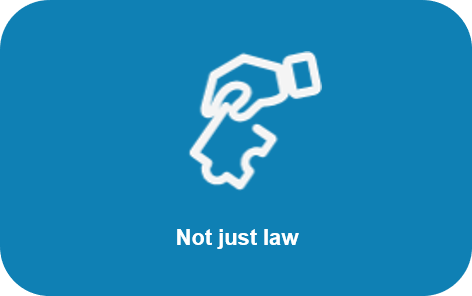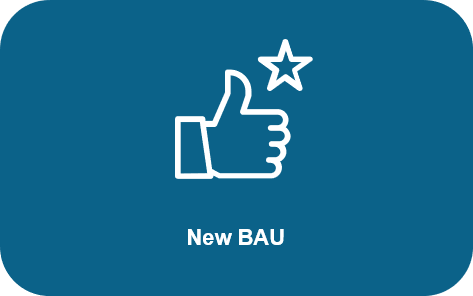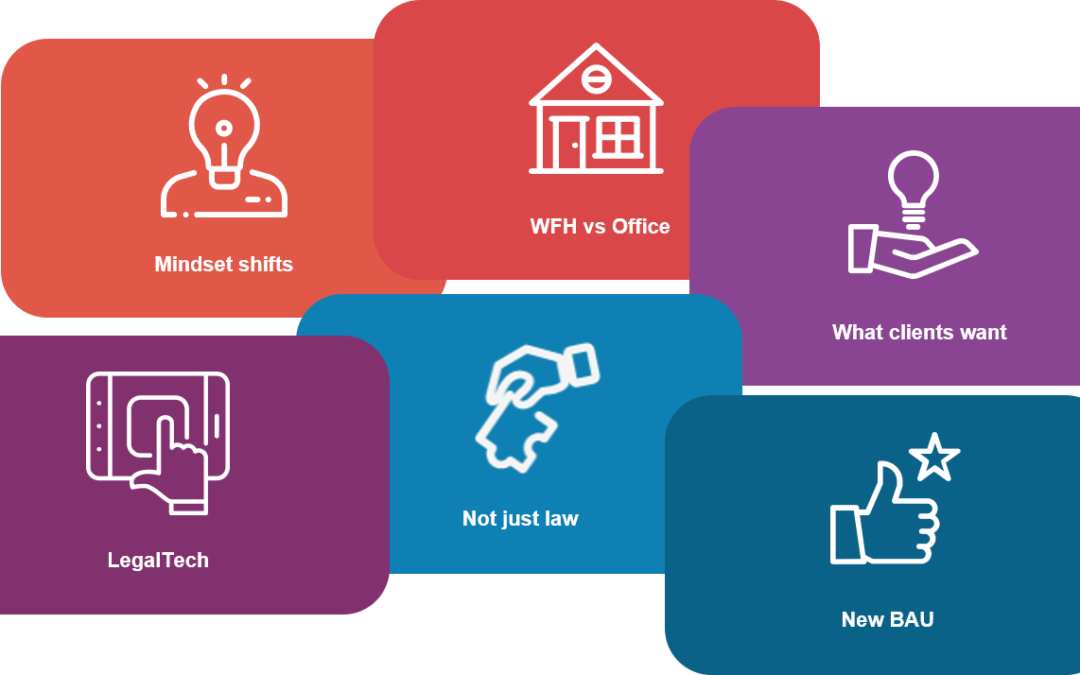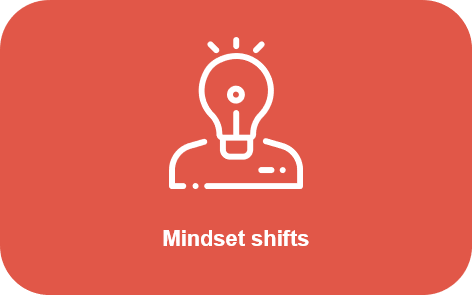I had the opportunity to reflect on the CLI-ALPMA Innovation and LegalTech 2021 Conference and on the final wrap up day explore the “stickiness of innovation post-pandemic” or essentially – what will make innovation and transformation sustainable in 2021 and beyond.
The discussion topics during the week – both live and on-demand – were wide ranging in both depth and breadth, however I took away six key themes:
- Mindset
- WFH vs Office
- What clients want
- Role of LegalTech
- Not just law
- The new BAU
Mindset Shifts
The pandemic has forced a lot of people outside of their comfort zone, from:
- WFH and juggling lockdown priorities,
- For some people, getting up to speed using new (to them) tech, and
- creating new ways of supporting remote legal service delivery.
Navigating these issues have brought to the fore a realisation for many we can still deliver and be productive while working in different ways (often coping better than expected without those previously “can’t-live-without-them-sitting-next-to-me” resources).
The last year has helped mindsets shift and highlighted some new capabilities that will be required to work in the changing legal ecosystem.
Academic black letter law excellence is an expected given, however, there is now a growing recognition that same legal advice is enhanced when delivered in a more holistic way solving more than just the clients’ law-based issue. As a result, we have seen an increased tolerance for experimenting, we’ve become more adaptable which has begun to foster a creative curiosity. We are starting to hear “well this worked, I wonder what else could we do differently?”.
We have all demonstrated more resilience and grit, along with empathy, EQ, and desire for collaboration and connection in a range of new ways. Mindsets are shifting towards the future of law and what it will look like…

Work from home vs return to the office
The fact is, we may never work the same again. Work is something we do – not necessarily a place we go.
If you can’t pivot to an output focus and trust your employees to work productively from home (or wherever they choose to work from), then maybe you aren’t hiring the right people?
We’re seeing an exodus from the cities, as sea-changers, tree-changers and ‘COVID refugees’ realise they can work from anywhere; there’s new ideas emerging like 15 minute cities; along with the desire for many to not go back to the office, or – at the very least – adopt a hybrid style of working post-pandemic.
The impacts of these changing work arrangements are already being felt, from office real estate and floor space requirements, to operating models and business support structures.
All of these scenarios will require different ways of working, collaborating and communicating – which will help innovation and transformation stick.
 What clients want
What clients want
Clients will have different expectations post-pandemic. We might not need to fly and meet in person as regularly, and we’ll find in-house teams becoming more self-sufficient and tech savvy.
We won’t be able to rely on *just* delivering great legal services – what will differentiate teams is the client experience you can provide. How can you transform and innovate to align your values with those of your clients, how can you exceed their expectations, how will you find out what your client likes, wants and needs in order to delight them? Ensuring ease of access and delivering the services basics will be the foundation on which we should build a better client experience.
In an increasingly disaggregated legal market, clients will continue to use their purchasing power to drive legal service providers to deliver in different ways. We will need to become even more empathetic and deliver more personal client-centric services, using more agile capabilities. These enhanced capabilities and services will be aided by a range of innovation and tech initiatives aimed at not only drawing out better data to deliver better insights, but harnessing new ways of working and maintaining relationships.
CX expert Carl White stressed the importance of providing ‘care beyond legal advice’ noting the client experience will increasingly become the commercial driver and key differentiator of success for legal service providers.
If they haven’t already, post-pandemic clients will become the change agents driving legal innovation, transformation and determining value, on which we need to deliver.
 LegalTech
LegalTech
We will see more tech that enables us to better capture data and turn insights into intel – and as Mick Sheehy said – we will move away from the purely transactional towards delivering management intel and more commercially relevant insights for clients.
The growth and rise of legal tech has evolved rapidly over the last 5-10 years and many are now hitting their straps maturing to add real value and deliver what the legal ecosystem needs. Further evolution will soon be upon us when LegalTech will simply be known as ‘technology’.
 Not just law
Not just law
New skill sets (at least for law) have emerged from project managers, legal engineers, legal design, and change managers to legal ops. All of which are changing the shape, look and feel of what it means to deliver client-centric legal solutions.
The more client problems we can solve for more clients, the stickier our innovation initiatives will be.
Alternative legal service providers are no longer “alternative”, NewLaw is no longer new – they are all an entrenched part of the legal ecosystem.
2021 we will us moving ever closer to a true multi-dimensional, collaborative mulit-disciplinary service offering, delivering business solutions with law at the core.
 New BAU
New BAU
Genevieve Collins who heads up Landers & Rogers suggests when looking to innovate and transform business we should be be delivering against three parallel horizons:
- how can we stabilise existing products and services,
- how can we modernise, and
- what do we need to do to transform to future proof the business.
That sort of operating model should be in everyone’s business strategy to ensure we remain relevant and sustainable.
Post-COVID there are many areas and ways of working we will likely never return to – look at what we have achieved around digital execution/signatures and online court hearings – cute kitten filters aside – along with online meetings and collaboration activities. The need remains for continuous improvement as we strive to increase efficiencies and streamline processes.
All five of these areas will combine and no longer be seen as ‘innovation’ or ‘transformation’ or ‘legaltech’, but simply become “the way we do things around here”. This is our new business as usual….
This is how innovation stickiness will maintain momentum post-pandemic… what do you think will make innovation stick?



